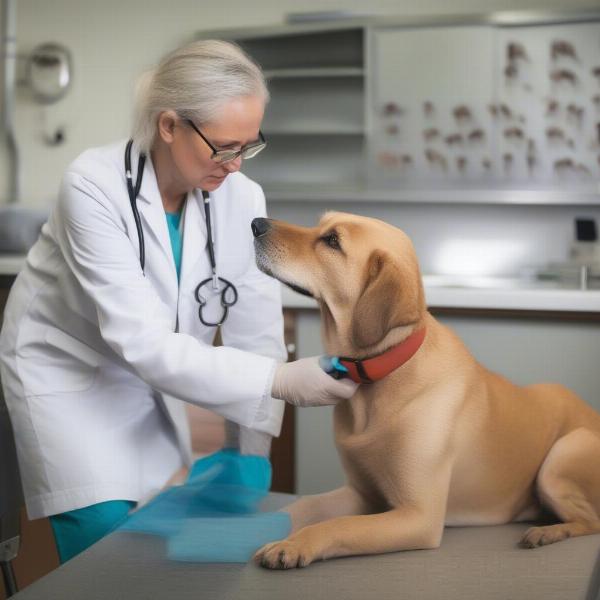Old dog pacing can be a concerning behavior for pet owners. Is it a sign of pain, anxiety, or simply old age? This article will delve into the common causes of pacing in senior dogs, offer practical solutions, and help you determine when it’s time to seek veterinary attention. Understanding why your old dog is pacing is the first step to providing them with the comfort and care they need in their golden years.
Why is My Old Dog Pacing?
There are several reasons why your senior dog might be pacing. It’s crucial to consider all possibilities, from medical conditions to changes in their environment. Identifying the root cause will help you address the issue effectively.
Cognitive Dysfunction Syndrome (CDS)
Similar to Alzheimer’s in humans, CDS can cause confusion, disorientation, and anxiety, leading to pacing. Dogs with CDS might pace aimlessly, appear lost in familiar surroundings, or vocalize more frequently.
Pain and Discomfort
Arthritis, hip dysplasia, and other age-related ailments can cause significant pain, leading to restlessness and pacing. Observe your dog for other signs of pain, such as limping, stiffness, or reluctance to move.
Anxiety and Stress
Changes in routine, new pets in the home, or loud noises can trigger anxiety in older dogs. Pacing can be a coping mechanism for this stress. Look for other signs of anxiety, such as panting, whining, or destructive behavior.
Vision and Hearing Loss
As dogs age, their senses can decline. Vision and hearing loss can disorient them, causing them to pace as they try to navigate their surroundings.
How to Help a Pacing Senior Dog
Once you’ve identified a potential cause, you can take steps to address your dog’s pacing. Remember, patience and understanding are key when dealing with senior dogs.
Veterinary Check-up
The first step is to rule out any underlying medical conditions. A veterinarian can diagnose potential issues like CDS, pain, or sensory decline and recommend appropriate treatment.
Creating a Calm Environment
A predictable routine, a quiet space, and familiar objects can help reduce anxiety and promote relaxation. Minimize changes in the environment and avoid exposing your senior dog to loud noises or stressful situations.
Mental Stimulation
Engage your dog in gentle mental activities like puzzle toys or short training sessions. This can help alleviate boredom and redirect their focus away from pacing.
Physical Comfort
Ensure your dog has a comfortable bed in a quiet area. Consider using orthopedic beds or heated pads to alleviate joint pain. Regular, gentle exercise can also help reduce stiffness and discomfort. If your dog has recently eaten a loaf of bread, ensure they are monitored for any signs of discomfort.
When to Seek Veterinary Help
If your dog’s pacing is sudden, severe, or accompanied by other symptoms like vocalization, aggression, or loss of appetite, consult a veterinarian immediately. These could be signs of a more serious underlying condition.
Is My Dog’s Pacing Normal?
While some pacing can be normal, especially in older dogs, excessive or sudden pacing is often a sign of an underlying issue. Don’t dismiss it as simply “old age.” dog ate loaf of bread
Can Medications Help My Pacing Dog?
Depending on the cause of the pacing, your veterinarian might prescribe medications to manage pain, anxiety, or cognitive decline. Never medicate your dog without consulting a veterinarian.
 Veterinarian Examining Senior Dog
Veterinarian Examining Senior Dog
Conclusion
Old dog pacing can be a complex issue with various underlying causes. By carefully observing your dog, consulting with your veterinarian, and implementing appropriate strategies, you can help your senior companion find comfort and peace in their later years. Addressing pacing promptly can significantly improve your dog’s quality of life and strengthen the bond you share. What do you think? Has your dog ever displayed puzzling behavior? Perhaps you could explore some solutions in our article on puzzled dogs. For those with smaller breeds, consider investing in a reliable gate, like the G8 gate, to provide a safe and contained space for them. puzzled dog dog g8 gate
-
What are the signs of cognitive decline in dogs? Disorientation, confusion, changes in sleep patterns, altered social interactions, house soiling, and increased vocalization are common signs.
-
How can I make my senior dog more comfortable? Provide a soft, orthopedic bed, maintain a consistent routine, offer gentle exercise, and ensure a calm environment. You might also consider melatonin and lignans for dogs to help with anxiety and sleep. melatonin and lignans for dogs dog laptop
-
Is pacing always a sign of a medical problem? Not always. Pacing can also be caused by anxiety, boredom, or changes in the environment. However, it’s essential to rule out medical causes with a veterinary check-up.
-
How much exercise does a senior dog need? The amount of exercise varies depending on the breed and individual dog’s health. Consult your veterinarian for recommendations tailored to your dog.
-
Can dietary changes help with pacing? A balanced diet is crucial for overall health. Discuss dietary needs with your veterinarian, as certain supplements or adjustments might be beneficial.
-
What are some calming techniques for anxious dogs? Creating a safe space, using calming pheromones, playing soothing music, and gentle massage can help reduce anxiety.
-
When should I be concerned about my dog’s pacing? If the pacing is sudden, excessive, accompanied by other symptoms, or significantly impacting your dog’s quality of life, consult a veterinarian.
ILM Dog is a leading international website dedicated to providing expert advice and resources on dog care and wellbeing. From breed selection to senior care, nutrition to training, we cover every aspect of responsible dog ownership. Our articles are written by experienced professionals, ensuring you receive accurate and up-to-date information. We also provide insights into the latest pet care trends and best veterinary practices. Whether you are a new dog owner or a seasoned expert, ILM Dog is your trusted source for all things canine. Contact us today for personalized advice and guidance. Email: [email protected], Phone: +44 20-3965-8624.